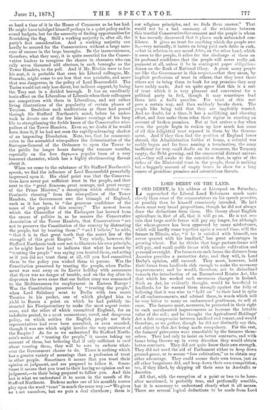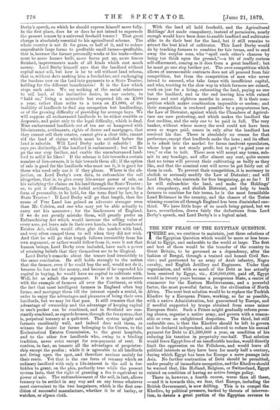LORD DERBY ON THE LAND.
LORD DERBY, in his address at Liverpool on Saturday, approached the Liberal Land Reformers much more closely than some of the commentators on his speech perceive, or possibly than he himself consciously intended. He laid down some very broad propositions, though he did not always draw the deductions from them. His theory about English agriculture is, first of all, that it will go on. He is not cer- tain that large arable farms will pay any longer, for although the wheat-grower has been oppressed by many misfortunes, which will hardly come together again a second time, still the farmer in Illinois, who, "if he is satisfied with himself, can never quarrel with his landlord," has great advantages in growing wheat. But he thinks that large pasture-farms will still pay, and small arable farms with minute cultivation and personal oversight. For farmers on such farms the distance from America provides a protective duty, and they will, in Lord Derby's opinion, still succeed. They must, however, hold their farms from landlords rich enough to make the necessary improvements; and he would, therefore, not be disinclined towards the introduction of an Encumbered Estates Act, like that which has worked such enormous changes in Ireland. Such an Act, he evidently thought, would be beneficial to landlords, for he warned them strongly against the folly of believing that it was wise to " hold on " to their land in spite of all embarrassments, and advised them, in words which will be very bitter to many an embarrassed gentleman, to sell at once. The farmers must., moreover, be protected in their right to such unexhausted improvements as increase the lettable value of the soil ; and he thought the Agricultural Holdings' Act a fair compromise between landlord and tenant, and would therefore, as we gather, though he did not distinctly say this, not object to this Act being made compulsory. For the rest, the farmers' grievances were remediable by the farmers them- selves. They had only to insist on better contracts, and with farms being thrown up in every direction they would obtain
better contracts. They did not quite know their own strength. They did not need the aid of Parliament either to keep down ground-game, or to secure "free cultivation," or to obtain any other advantage. They could secure their own terms, just as all other bargainers did, and keep down their own competition, too, if they liked, by shipping off their sons to Australia or America.
All that, with the exception of a point or two to be here- after mentioned, is perfectly true, and profoundly sensible, but it is necessary to understand clearly what it all means. There are several logical deductions to be made from Lord Derby's speech, on which he should express himself more fully. In the first place, does he or does he not intend to supersede the present tenure by a universal freehold tenure ? That great change is absolutely essential to his agricultural scheme. The whole country is not fit for grass, or half of it, and to reduce unprofitable large farms to profitable small farms—profitable, that is, because the farmer personally works at his trade—there must be more houses built, more barns put up, more fences finished, improvements made of all kinds which cost much money. Lord Derby himself says that the landlord without capital must sell, but how is he to sell without land reform, that is, without Acts making him a freeholder, and exchanging the burdens now on the land into payments to a State Trustee, holding for the different beneficiaries? It is the Law which stops such sales. We say nothing of the social reluctance to sell land, of the instinctive desire, in our society, to "hold on," living a miserable but respected life on £500 a year, rather than retire to a town on £1.000, of the inability of landlords to find any occupation but landlording, or of the growing difficulty of providing for average boys. We will suppose all embarrassed landlords to be either sensible or desperate, and point only to the legal difficulty, which is final. Nine embarrassed landlords out of ten are so hampered with life-interests, settlements, rights of dower and mortgages, that they cannot sell their estates, cannot give a clear title, cannot rid the land of claims which must be satisfied before the land is saleable. Will Lord Derby make it saleable ? He says yes distinctly, if the landlord is embarrassed ; but will he go the one step farther, and enable the unembarrassed land- lord to sell if he likes ? If the scheme is fair towards a certain number of lien-owners, it is fair towards them all ; if the option of sale is good for the landlords who must use it, it is good for those who need only use it if they please. Where is the ob- jection, on Lord Derby's own data, to enfranchise the soil altogether, that is, to give every life-owner power of sale, on his satisfying the claims on his land through. the State Trustee ; or, to put it differently, to forbid settlements except in the form of personalty, to be held, for the term fixed by law, by a State Trustee ? If Lord Derby will go that length, then the cause of Free Land has gained an advocate stronger even than Mr. Cobden, and one who may yet be able actually to carry out his measures ; for the landowners of England, if we do not greatly mistake them, will greatly prefer an Enfranchising Act which would increase the selling value of every acre, yet leave sale in their own hands, to an Encumbered Estates Act, which would often glut the market with land, and very often compel them to sell when they did not wish. And that he will go that length follows irresistibly from his own argument, or rather would follow from it, were it not that human beings, Lord Derby even included, have such a power of retaining beliefs that they themselves see to be illogical.
Lord Derby's remarks about the tenure lead irresistibly to the same conclusion. He still holds strongly to the notion that the farmer, even if he could buy the soil, would not do it, because he has not the money, and because if he expended his capital in buying, he would have no capital to cultivate with. Well, let us admit the argument. It is not in accordance with the example of farmers all over the Continent, or with the fact that most intelligent farmers in England often buy farms, and mortgage them till the interest equals a rental, in order to enjoy the advantages and pleasures of being their own landlords, but we may let that pass. It still remains that the advantage of ownership and the advantage of keeping capital in one's pocket can be combined, and in Scotland are con- stantly combined, as regards houses, through the feu system, that is, perpetual tenancy at a quit-rent. That system might suit farmers excellently well, and indeed does suit them, as witness the desire for farms belonging to the Crown, to the Ecclesiastical Estates Commission, to the great hospitals, and to the other few landlords who, owing to a binding tradition, never evict except for non-payment of rent. It confers, in fact, on tenants all the advantages of proprietor- ship except the profits ; while it is agreeable to all landlords not living upon the spot, and therefore anxious mainly for their rents. Yet that is the one form of tenancy which an ordinary landlord with only a life-interest in the soil is for- bidden to grant, on the plea, perfectly true while the present system lasts, that the right of granting a feu is equivalent to power of sale. The enfranchisement of the soil, in fact, allows tenancy to be settled in any way and on any terms whatever most convenient to the two bargainers, which is the first con- dition of successful manufacture, whether it be of barley, or watches, or alpaca cloth. With the land all held freehold, and the Agricultural Holdings' Act made compulsory, instead of permissive, nearly enough would have been done to enable landlord and cultivator alike to do their best for the land, but it still remains to attract the best kind of cultivator. This Lord Derby would do by teaching farmers to combine for fair terms, and to send away the surplus sons, who "spoil each other's chances by being too thick upon the ground,"—a bit of really curious self-effacement, coming as it does from a great landlord ; but he must go one step further yet. The over-competition which allows of unreasonable contracts does not all proceed from fair competition, but from the competition of men who never intend to succeed, who take farms with insufficient capital, and who, trusting to the slow way in which farmers are ruined, work on just for a living, exhausting the land, paying no one but the landlord, and in the end leaving him with ruined farms and rent eighteen months in arrear. It is their com- petition which makes combination impossible or useless; and their competition is rendered possible by a preposterous law, the Law of Distraint, against which the Chambers of Agricul- ture are now protesting, and which makes the landlord the first creditor, and the only one to be paid in full. The very banker, without whose money the seed could not have been sown or wages paid, comes in only after the landlord has received his due. There is absolutely no reason for that preference, except that landlords make the laws ; and its effect is to admit into the market for farms insolvent speculators, whose hope is not steady profit, but to get "a good year or two," or else to bolt. These men will accept any terms, sub- mit to any bondage, and offer almost any rent, quite secure that no terms will prevent their cultivating as badly as they like, and that the nominal rent will never be got fairly out of them in cash. To prevent their competition, it is necessary to abolish or seriously modify the Law of Distraint ; and will Lord Derby, who contends for free bargaining, go so far ? If he will enfranchise the land, and make the Holdings' Act compulsory, and abolish Distraint, and help to teach farmers to combine for fair terms, he is the most formidable Land Reformer in the country, and the chance of the Tories winning counties all through England has been diminished one- third. We have little hope of so much being gained, but we have, nevertheless, drawn fairly the deductions from Lord Derby's speech, and Lord Derby's is a logical mind.



































 Previous page
Previous page